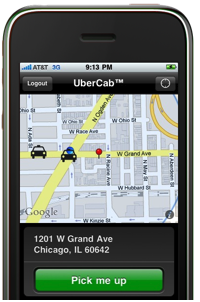
Did Ubercab just crash and burn? Taxi and limo industry insiders in California today informed TechCrunch that the San Francisco Metro Transit Authority & the Public Utilities Commission of California have ordered the startup to cease and desist.
UPDATE: Since the orders arrived on October 20th, Ubercab has remained in service under threat of penalties including up to $5,000 fee per instance of Ubercab’s operation, and potentially 90 days in jail per each day the company remains in operation past the orders.
The company’s brand name and logo appear to be in metamorphosis; on its website and blog, Ubercab’s logo now reads simply “Uber,” and the company commented to its own Facebook community yesterday afternoon, “more uber than cab.”
Chief executive of Ubercab Ryan Graves told TechCrunch, “We are working with the agencies [involved] to figure out their exact concerns and make sure that we’re in compliance.” He wouldn’t comment beyond that, but pointed to the company’s official public statement posted on its blog today (October 24th):
UberCab Inc. has been issued a cease and desist order from the SF Metro Transit Authority & the Public Utilities Commission of California. While we are looking into the issues raised, we believe that the service we offer is in compliance with the cited regulations.
UberCab is a first to market, cutting edge transportation technology and it must be recognized that the regulations from both city and state regulatory bodies have not been written with these innovations in mind. As such, we are happy to help educate the regulatory bodies on this new generation of technology and work closely with both agencies to ensure compliance and keep our service available for our truly Uber users and their drivers.
Our commitment is to facilitate an improved transportation option that provides safe, reliable, and convenient travel. That will not change. We will continue full speed ahead with the mission of making San Francisco city a great place to live and travel.

Ubercab’s mobile apps let users request a car service to pick them up wherever they are right now, and let users pay for that car service with their phones. The startup takes a cut of the money made by drivers to generate revenue. Earlier this month, Ubercab closed a $1.25 million angel investment led by First Round.
The funding came despite the fact that the San Francisco taxi industry has been rumbling about whether Ubercab’s business is legal since September. A concerned driver brought the matter up at a Taxi Advisory Council meeting, reported The Phantom Cab Driver Phites Back blog.
One of the company’s investors and founders Travis Kalanick said on Sunday, “We’ve seen this before. New technology comes in and appears threatening to incumbent industries at first. At the end of the day, those industries see the benefit of that technology and ultimately find ways of using it in a productive manner, and embracing innovation.” Kalanick also founded the early p2p (peer to peer) search engine called Scour, which drew resistance from Hollywood executives who didn’t want their content distributed online in the 90s.
The incumbent taxi industry’s concerns about Ubercab include the following:
- Ubercab operates much like a cab company but does not have a taxi license.
Its cars don’t have insurance equivalent to taxis’ insurance.
Ubercab may threaten taxi dispatchers’ way of earning a living.
Limos in U.S. cities usually have to prebook an hour in advance, by law, while only licensed taxis can pick someone up right away but Ubercab picks people up right away (again without a taxi license).
In contrast, Uber— nee Ubercab — often pitches itself not as a taxi service, but an app that helps ride seekers book a premium car and driver quickly and easily via mobile, and helps licensed limo drivers connect with clients.
More: UberCab Cease & Desist Means One Thing: They’re Onto Something
